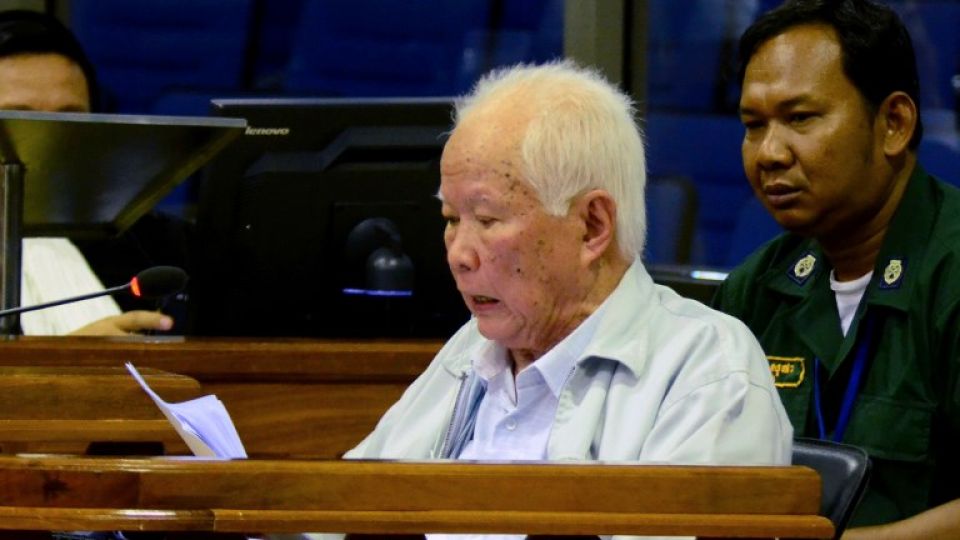November 16, 2018
Tribunal to deliver verdicts against two Khmer Rouge leaders for Cambodian genocide.
The Extraordinary Chambers in the Courts of Cambodia (ECCC) are to deliver the verdict on Friday, in the trial of former Khmer Rouge leaders Nuon Chea and Khieu Samphan, in a pronouncement hailed as a “historic event for Cambodia and the world”.
The verdict from the ECCC, also known as the Khmer Rouge tribunal, will come after Case 002/2, which charged the men with crimes against humanity, war crimes and genocide, took 283 days to be heard over a three-year period.
Trial Chamber of the Khmer Rouge tribunal spokesman Neth Pheaktra said at a press briefing on Thursday that the verdicts in Case 002/02 will be announced from 9:30am, with around 500 representatives from the UN, the Cambodian government, embassies and members of the public present.
“The trial is a part of the process of providing justice for the victims who were killed during the Democratic Kampuchea regime, as well as for those who survived.”
“The pronouncement of the verdict on Friday is a historical event for the Khmer Rouge tribunal, for Cambodia and for the world, as well as for international justice,” Pheaktra said.
The hearing of oral arguments and the conclusion of Case 002/02 were against Samphan, the former head of the Democratic Kampuchea, and Chea, the former deputy secretary of the Cambodian Communist Party and president of parliamentarians in the Khmer Rouge regime.
During the oral arguments, the testimonies of 185 people were heard, of which 114 were witnesses and 63 civil parties, while eight came from experts.
Around 83,000 members of the public attended the hearings of Case 002/02 over the course of its 283-day process.
The Khmer Rouge tribunal began hearing evidence in Case 002/02 on October 17, 2014, with subsequent hearings until January 11 last year, when the case closed.
“The accused are ready to attend the pronouncement of the verdicts on [Friday]. Khieu Samphan and Nuon Chea were accused in Case 002/02 of committing crimes against humanity and war crimes, and of carrying out genocide against Cham people and the ethnic Vietnamese,” Pheaktra said.
He said the facts brought to trial regarding crimes against humanity were related to cooperative work sites at the Ang Trapaing Thmor reservoir in Banteay Meanchey province, the 1 Makara dam in Kampong Thom, the Kampong Chhnang airport, Phnom Penh’s S21 Security Center in Tuol Sleng and the Kraing Tachan, O’Kan Seng, and Krol mountain security centres, as well as cases of forced marriage.
For the genocide charges, the trial chamber focused on acts carried out against the Cham and ethnic Vietnamese, and against Buddhists and former civil servants of the previous Khmer Republic government.
Pheaktra said the trial chamber had taken so long on Case 002, phase 2, due to the complexities of the case, including the large numbers of civil parties, and the huge body of evidence that the trial chamber had to translate into three languages.
The re-hearing of some witness testimony to get clearer confirmation on the events took time, as did resolving legal issues and disagreements during the process.
Ngieng Than, a Vietnamese man who lost seven members of his family to the Khmer Rouge, said he welcomed hearing the verdict on Friday and spoke of his wish for a search for others involved in the killing of Vietnamese so they could also be punished and provide justice for the families of those murdered.
“We were happy when we heard that the judgment against the Khmer Rouge leaders [is to come on Friday], but we want a search for the regional leaders who had ordered the killing of my family members.”
Youk Chhang, executive director of the Documentation Center of Cambodia (DC-Cam), said he welcomed the coming verdicts as they would serve as a lesson for the younger generation to prevent such horrors happening again and provide justice for the Khmer Rouge victims.
“The case . . . ends the sadness in Cambodia, although the injury is deep. It will end this sad story,” he said.
The Trial Chamber of the Khmer Rouge tribunal on August 7, 2014, found Chea and Samphan guilty in Case 002/01 over crimes committed during the Democratic Kampuchea regime. They were sentenced to life in prison.
According to the court report, the operations from 2006 to 2017 cost $318.9 million. Japan donated the most, an equivalent of 29 per cent of the total ECCC budget.


